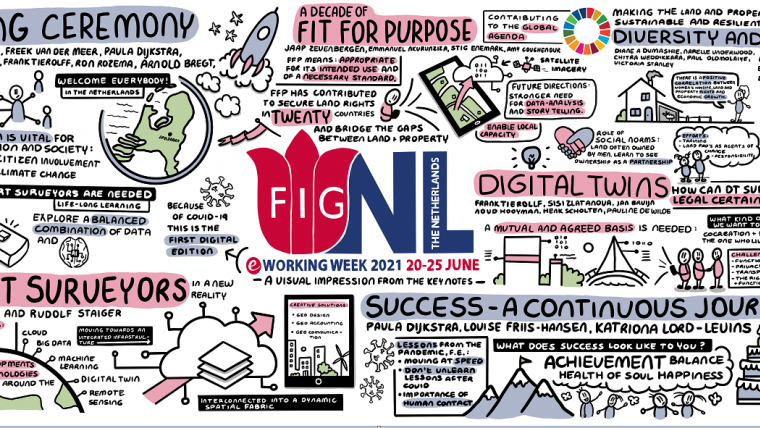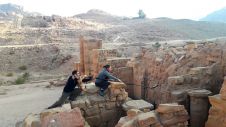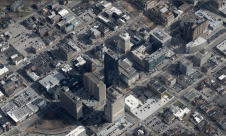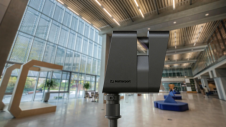FIG e-Working Week 2021: A Success Story of the New Reality
Bringing together over 1,300 participants from all over the world for a week packed with inspiring sessions, the FIG e-Working Week can be regarded as a success story of the new reality. It took place online in late June, hosted by FIG and the Dutch organizing partners GIN, Kadaster and ITC. The online platform facilitated lively interactions between international colleagues and friends and enabled them to catch up on the latest updates, research and developments.
FIG and the Dutch local organizers were keen to not ‘merely’ organize some sessions, but instead to create the sense of a fully-fledged conference to make the participants feel truly part of the surveying community. The current COVID-19 pandemic situation has forced other conference organizers to either connect online or cancel the event. FIG and the local organizing partners embraced the challenge and were motivated to explore the new horizons.
FIG President Rudolf Staiger and Director Louise Friis-Hansen were able to travel to the Netherlands for the occasion. In the Dutch city of Apeldoorn, a studio was set up to broadcast the event, as well as a technical support hub. Another technical hub was set up at the FIG offices in Copenhagen, Denmark, as well as a hub for those who supported from their home offices.
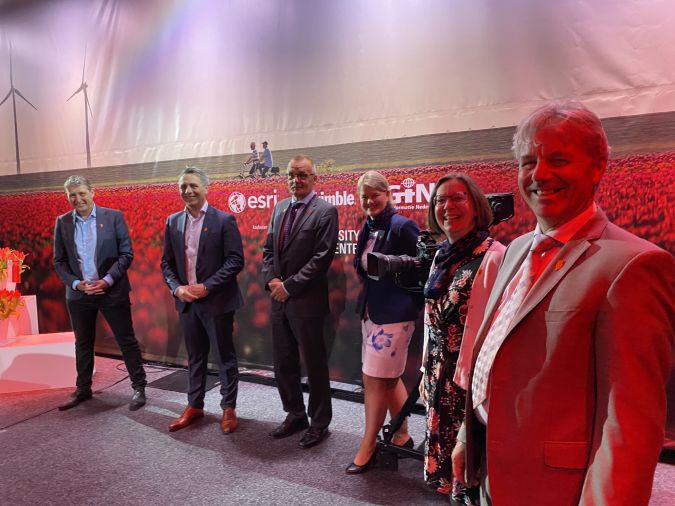
7 inspiring keynotes
The event was defined by seven unique sessions. Besides aligning them with the theme of ‘Smart Surveyors for Land and Water Management, Challenges in a New Reality’, the aim was twofold: to create dynamic keynote sessions, and to support diversity. One advantage of the virtual setting was that speakers from around the world, who would normally struggle to travel to events due to their busy schedules, could now make a contribution after all. The use of a professional studio created a dynamic experience for viewers, even when a speaker was broadcasting from their home office.
In total, 27 speakers and chairs were involved in the keynote sessions, representing both the public and private sector as well as academia and NGOs, different regions and generations, and with a good gender balance.
This combination of having high-level speakers on relevant topics, spread out through the event and with a focus on diversity as well as the television-style broadcast gave the keynote sessions an inspiring and professional character. More details of each keynote session will be published over the coming months.
Over 70 other sessions
The event organizers put a lot of effort into creating and designing sessions that would work in an online setting. Session organizers were informed about the options beforehand and encouraged to include interviews, chats, panel discussions and so on to maximize the dynamism. The online platform supported this, with the option to adapt the layout of speakers and presentation screens.
Of the 335 accepted abstracts, only a few were upgraded for presentation in a session. All authors were given the option to produce a video presentation for publication in the proceedings together with the full papers. All abstracts were connected to a session and were used for reference material, and the authors also had a role in the ‘Ask-me-anything’ (AMA) sessions after the actual session.
The FIG e-Working Week was organized as a global event. All time zones were considered, but it was challenging – and not always possible – to accommodate all of them. That sometimes meant that speakers contributed at inconvenient times (e.g. in the middle of the night) or from unusual locations (e.g. the backseat of a car). Many sessions were well attended and numerous viewers actively participated in the chats.
The online system made it easier to move from one session to another as well providing the opportunity to switch between several parallel sessions. Another valuable addition was that all sessions could be easily recorded, so that they could be made available to registered participants after the event.
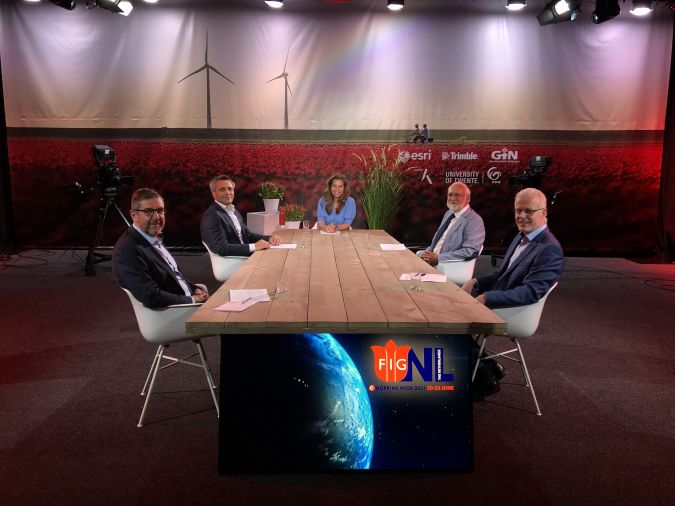
New: a workshop day
Instead of pre-events, the organizers chose to hold a virtual workshop day within the technical programme. The workshops enabled the participants to take a deep dive into the content of the workshops and allowed more interaction between the workshop hosts, speakers and attendees. Based on the positive feedback, this could become a successful feature for future (virtual) events.
An event with a Dutch touch
By bringing the Working Week to the Netherlands, the organizers wanted to highlight the role of the surveyor in land and water management, which is a topic close to the nation’s history and future. For centuries, the Dutch have succeeded in building and managing a densely populated coastal country, of which almost half of the land area is below sea level. And that expertise is even more crucial today in the context of protecting the country against the impact of sea-level rise caused by climate change.
Throughout the event there was a Dutch touch. In the opening ceremony the scene was set by the four Dutch members of FIG: GIN, Kadaster, ITC and GIM International. The first three welcomed the participants with opening statements. GIM International prepared a trilogy related to the theme of the event. The importance of integrated land and water management, the added value of cooperation in the triple helix with government, private sector and academia, as well as our joint responsibility to achieve the Sustainable Development Goals were addressed in keynote sessions as well as technical sessions. Several Dutch organizations and leading Dutch experts contributed to the technical programme. The opening ceremony can be viewed from the proceedings.
The technical support by the organizing team was also tangible throughout the event, with team members working from early morning until late at night – both on location and from home – to support all sessions and to solve any issues as quickly as possible.
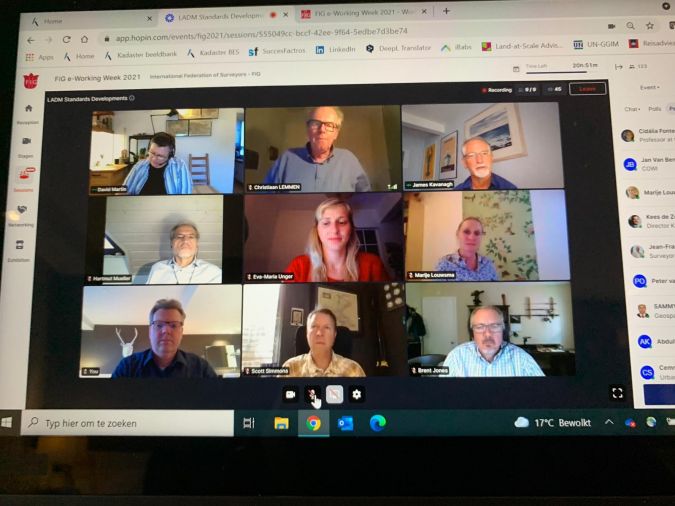
The biggest difference
Organizing an entirely virtual event is different, more time consuming in advance and presents more uncertainties than a face-to-face event. Nobody within FIG nor the Local Organizing Committee (LOC) had organized a major international online event before. It was new territory and there were no guidelines or manuals to answer questions such as: What are the options for a virtual platform? How should sessions be designed? What can we offer to sponsors? What is a reasonable fee? And how many participants can we expect?
The organizers embraced the challenge and extended their virtual horizons, with FIG and LOC working as team. After selecting the platform, the next steps were the redesign of the technical programme, adapting the sponsor opportunities and expanding the support team from 10 to 30 people. It was hard work, with a lot of effort put into creating a balanced programme and engaging the community. The team were convinced that if they provided a solid foundation, the FIG community would bring the spark to light the flame.
Needless to say, there were some challenges throughout the event, but the knowledge and teamwork of FIG and LOC paid off in being able to quickly tackle any issues.
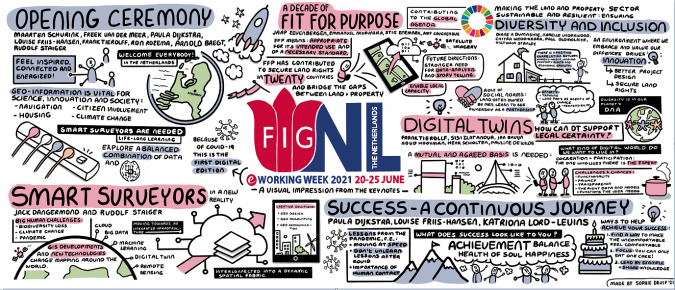
Lessons learned
In challenging times, the organizers have shown that a virtual event works. It was the perfect solution in the current phase. It demonstrated the added value of staying connected to exchange visions of what lies ahead and to inspire each other with perspectives and knowledge.
FIG can certainly use the experience gained during this event for future smaller FIG events and meetings. However, it is still crucial to meet face to face once in a while. Spending time together at a gala dinner, going on a technical tour together and simply looking each other in the eyes all help to create a solid foundation for future successes.
The local hosts look back on the success of the event with a sense of pride. The cancellation of FIG2020 and the acceptance of taking over the organization of FIG2021 from Ghana came somewhat unexpectedly. Nevertheless, they rose to the challenge of hosting the FIG Working Week virtually. Together with FIG, they explored the options and defined their goals – both motivated and ambitious to create more than ‘just’ a conference, even though it entail much more work than for a ‘normal’ Working Week. The organizers would like to thank everyone who contributed to the success of the conference.

Value staying current with geomatics?
Stay on the map with our expertly curated newsletters.
We provide educational insights, industry updates, and inspiring stories to help you learn, grow, and reach your full potential in your field. Don't miss out - subscribe today and ensure you're always informed, educated, and inspired.
Choose your newsletter(s)
